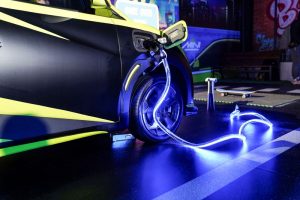Chinese electric vehicle leader BYD continued an aggressive push into Southeast Asia through the first half of the year, expanding its lead in the region over US rival Tesla.
Singapore has emerged as one of the main markets that BYD is focusing in the region, along with Thailand, with the Chinese firm gaining a lead in sales in the city-state despite little price difference in cars from Tesla.
Singapore plans to stop the registration of new internal combustion engine (ICE) cars from 2030, and phase them out entirely in the decade after. EV sales in the city-state accounted for around one third of total vehicle sales in the first half of this year.
Also on AF: Potential Trump Win Worries Asian EV Firms – But China’s Happy
A small, wealthy island with a population of 5.9 million, Singapore is one of Southeast Asia’s smallest auto markets.
Vehicle taxes are among the highest in the world and to purchase a car, buyers need a “certificate of entitlement” costing about S$100,000 ($74,000).
BYD has ramped up its marketing efforts too woo potential buyers on the island. It opened two restaurants where consumers can dine on dishes inspired by its car models and book a test drive.
Those efforts led BYD’s EV sales in Singapore to jump 83% in the first half of the year from the entire 2023 level to 2,587 units.
Meanwhile, second-ranked Tesla sold just 28 more cars during the period than last year, when it put 969 Teslas on the roads.
Wider push in the ‘hottest EV market’
The push in Singapore is part of BYD’s larger strategy to aggressively gain ground in Southeast Asia, where increasing climate-consciousness and changing government policies have led to a boom in demand for EVs.
BYD has already had early success in the region — dubbed the world’s hottest EV market.
The Chinese firm claims Thailand as its biggest overseas market as it expands distribution partnerships with local conglomerates.
It also opened its first stores in Vietnam last week, where it will sell three models initially, including its compact crossover Atto 3. Tesla has yet to start vehicle sales in the country.
In the broader Southeast Asia market, meanwhile, Tesla saw its market share fall to 4% in the first quarter of this year from 6% a year earlier.
That was even as the region’s overall EV market grew by 37% during the same period, according to the latest data from research firm Counterpoint.
Challenge and opportunity
The Southeast Asian push is particularly crucial for BYD as it looks to tackle a slowdown in China’s EV market. The carmaker’s hope of expanding aggressively in Europe has also had a setback, due to the bloc’s new tariffs on China-made vehicles.
Those challenges are likely to plague the carmaker in SE Asia too, however. Early this month, Thai authorities began investigating BYD’s dealers after a consumer complaint over aggressive discounting.
An invasion of Chinese EVs has also led to a spate industrial closures and thousands of job losses in Thailand — a development that is now alarming the country’s government.
Even so, BYD posted a 21% rise in electric vehicle sales for the second-quarter of 2024, closing its gap as the world’s biggest seller with Tesla.
In contrast, Elon Musk led Tesla reported its lowest profit margin in more than five years and missed Wall Street earnings targets in the second quarter, hurt by mounting price competition from rivals amid a sharp slowdown in global EV demand.
- Reuters, with additional editing by Vishakha Saxena
Also read:
China’s BYD Opens Its First EV Plant in Southeast Asia
China EV-Makers Eat Into Japan, Korea’s Markets in SE Asia
BYD’s Thai Distributor to Triple EV Outlets as Sales Boom
Tesla Eyes Southeast Asia’s EV Boom But Faces China Challenge
Tesla in Thailand Electric Vehicle, Battery Factory Talks
China’s Hozon Taps Thailand to Make EVs For Southeast Asia
China EV Firms Scaling Back European Plans Over Subsidy Probe
























